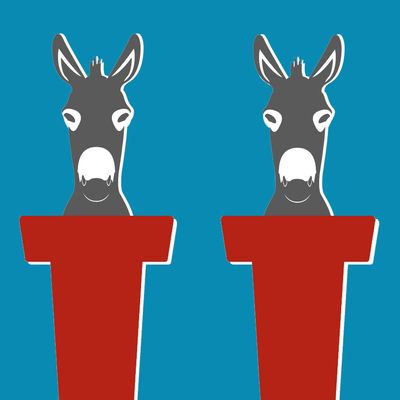
One complication produced by the giant Democratic presidential field assembling for 2020 involves candidate debates. Republicans faced something similar in 2016 and decided to separate their candidates into two tiers based on polling results, with lesser candidates relegated to a preliminary “kiddie table” event that drew much viewership and media attention. The Democratic National Committee, probably sensitive to charges that it had “rigged” the 2016 nomination to help the front-runner, chose not to go in that direction. For the first two rounds of debates scheduled for this summer (on June 26 and 27 in Miami, on NBC, MSNBC, and Telemundo; and on July 30 and 31 in Detroit, on CNN) it will hold two equal debates on consecutive weeknights, with qualifiers assigned to one or the other randomly.
But since participation in each event is (sensibly) capped at ten candidates, there’s a risk of exclusion even for those who meet one of the two thresholds set by the DNC:
Polling Method: Register 1% or more support in three polls (which may be national polls, or polls in Iowa, New Hampshire, South Carolina, and/or Nevada) publicly released between January 1, 2019, and 14 days prior to the date of the Organization Debate. [surveys from 18 pollsters were specified as qualifying].
Grassroots Fundraising Method. Candidates may qualify for the debate by demonstrating that the campaign has received donations from at least (1) 65,000 unique donors; and (2) a minimum of 200 unique donors per state in at least 20 U.S. states.
At this point, 17 of the 21 announced candidates (all but Michael Bennet, Wayne Messam, Seth Moulton, and Marianne Williamson) have qualified by one method or the other (Montana governor Steve Bullock and New York mayor Bill de Blasio are likely to push the total number of candidates to 23 very soon). If the qualifiers rise above 20, then candidates who meet both thresholds will be first to make the cut. Currently 11 candidates (Biden, Booker, Buttigieg, Castro, Gabbard, Harris, Klobuchar, O’Rourke, Sanders, Warren, and Yang) meet that standard, while Delaney, Gillibrand, Hickenlooper, Inslee, Ryan, and Swalwell have met the polling but not the fundraising threshold.
These latter candidates, understandably, feel they need to qualify via fundraising to make absolutely sure they get a spot in the debates, as Politico reports:
Sen. Kirsten Gillibrand sank a ping-pong ball into a cup of water — a spin on the drinking game, beer pong — and turned the moment into a digital ad urging $1 donations to her presidential campaign. Washington Gov. Jay Inslee is hawking bumper stickers for $1 donations and used his recent CNN town hall to make a televised plea for more campaign contributions. Former Rep. John Delaney promised to give $2 of his own money to charity for each of the next 100,000 individual donors who gave to his campaign.
The unconventional, often gimmicky fundraising arms race is part of a desperate scramble to make it past a new threshold set by the Democratic National Committee, 65,000 individual donors, to the first primary debates in June and July. The televised debates could be make-or-break showcases for the 2020 presidential candidates, and the requirement has reshaped the strategy of candidates struggling to cross the donor mark, changing spending priorities and altering the path of their campaigns.
While the DNC did specify that qualifying polls had to be released 14 days before the debate in question, it did not set a deadline for certifying fundraising numbers (though it did identify a certification process). So the scramble for the final spots could be intense. And if more than 20 candidates meet both thresholds by the time the qualifiers are identified, the second tie-breaker is higher average poll standings.
The good news for last-minute qualifiers is that once you’re past the velvet rope, the random assignment process means you could wind up in the center of the stage on the first night, even if you got onto it by the skin of your teeth. The bad news is that the DNC’s thresholds could be changed, or simply tightened, for future debates. Indeed, if the first round turns out to be a fiasco, you can count on tougher standards as actual voting draws nigh.






























